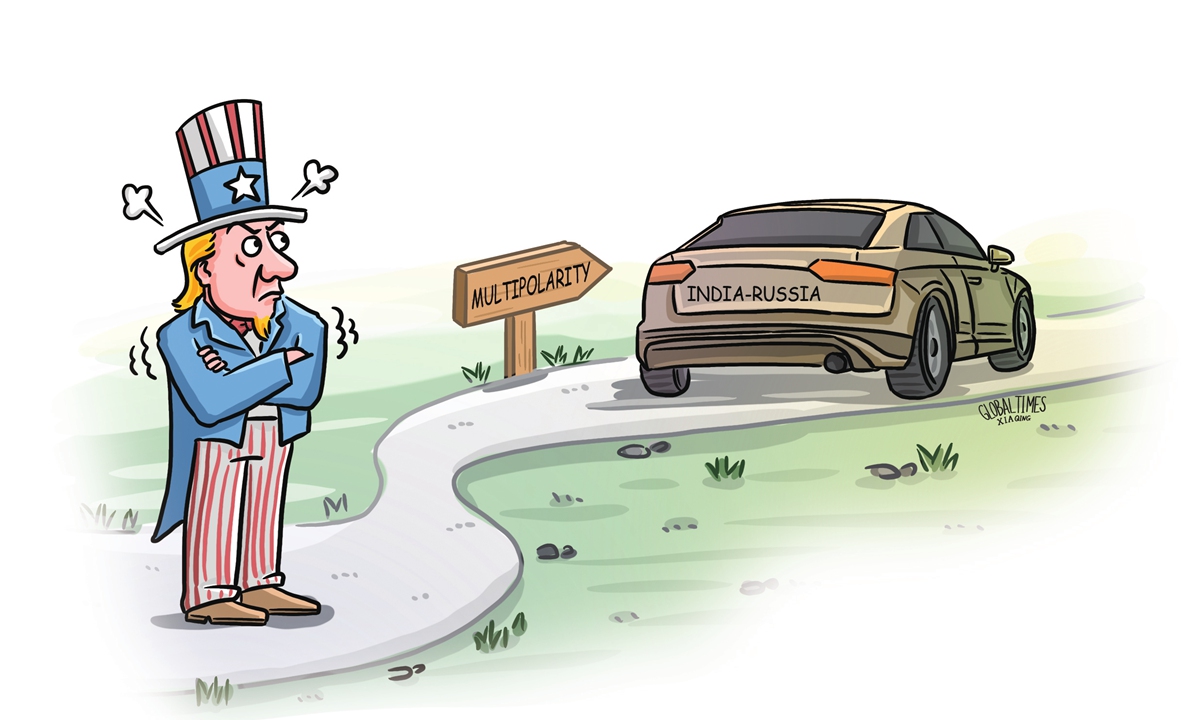
Despite irritating US, India deepens Russia ties, embraces multipolarity
- 网站介绍
- 相关推荐
- 相关资讯

Illustration: Xia Qing/GT
It is quite astonishing that the US has so much influence around the world, while representing less than 5 percent of the global population. The key to this inordinate power is the divide-and-rule playbook, which is effective as long as the imperialist nation is much stronger and wealthier than its geopolitical pawns. However, that differential power is shrinking rapidly as evidenced by a myriad of geopolitical events, including Modi's ongoing visit to Russia - the first in five years.When the Russia-Ukraine conflict first began, the US was very hopeful that India's relations with Russia would deteriorate. However, that fantasy has been evaporating in recent times as India continues to strengthen its trade and diplomatic relationship with the world's most-sanctioned country. Despite the threat of even more US sanctions, Russia has become the No.1 supplier of oil for India, which in turn is the top buyer of seaborne Russian oil. In June, India bought a stunning 2.13 million barrels of oil per day from Russia.
Further irritating Washington, India has taken a neutral stance regarding Ukraine; and Modi even refused to attend the peace summit in Switzerland.
Ignoring public threats from the US, Modi has significantly boosted India-Russia cooperation in military affairs. For example, India bought the Russian S-400 missile defense systems. More remarkably, India and Russia are considering cooperation on numerous strategic areas such as joint production of weapons, reciprocal access to military facilities, joint deployment of troops, warships and fighter jets - which will be unprecedented for India - and logistics agreements, which would facilitate the use of each other's military bases for refueling, repairs and resupply.
Russian Foreign Minister Sergey Lavrov has characterized Russia's relations with India as the "special and privileged strategic partnership." Indian External Affairs Minister Subrahmanyam Jaishankar added, "The only constant in global politics are the ties between India and Russia."
Considering that the US dollar underpins much of the American empire's power, it has been astonishing how India has enthusiastically embraced dedollarization. India and four ASEAN countries recently announced a digital platform that would enable instantaneous cross-border retail payments, circumventing the mighty dollar. Last year, India and the UAE formalized an agreement to settle transactions in their local currencies. And 60 percent of Russia-India trade is now happening in either rubles or rupees.
There are two more transformative deals with respect to trade: the Chennai-Vladivostok maritime route and the International North-South Transport Corridor (INSTC), which are aimed at long-term integration of the Indian and Russian economies. The win-win paradigm of these initiatives is indisputable. The INSTC also brings Iran - another American adversary - into the mix. India has even defied the US to strike a 10-year deal to develop Iran's Chabahar port.
But why the sudden epiphany? The answer lies in the global events over the last four years.
When COVID erupted, the imperialist soothsayers claimed that the pandemic would mark the beginning of the end for China as an industrial powerhouse. They predicted that the entire world would decouple from China and quickly move manufacturing back to their own countries or to friendly nations. However, China continued to rise and even became the world's largest exporter of cars.
Then came the Ukraine war, which was expected to lead to the collapse of Russia and a regime change that would remove Putin from power. Instead, Russia emerged victorious against the US and Europe on the battlefields in Ukraine. Furthermore, Russia's economy kept growing and surpassed that of Germany (in terms of purchasing power parity). And when the US froze $300 billion of Russian foreign exchange reserves, leaders in developing nations began to view the US as an economic terrorist. This led to the expansion of BRICS and an acceleration of dedollarization.
Then came the slaughter of women and children in Gaza. When the International Criminal Court and the International Court of Justice started to portray Israel's actions as a "genocide," the West quickly rejected the courts, revealing to the world the emptiness of the slogan "international rules-based order."
In summary, the American empire has proven itself to be increasingly irrelevant. Thus, India - just like much of the Global South - is embracing strategic ambiguity and multipolarity. The US has the choice to either join this new and peaceful multipolar world or become a bitter and isolated hegemon.
The author is a geopolitical analyst, columnist, blogger, podcaster, and writer based out of Bangalore, India. His work can be found on Substack, X and more. [email protected]

腋臭气味重和腋毛多有关吗 刮掉腋毛能减轻腋臭吗
关于腋臭,众所周知其是因为细菌分解汗液中的脂质物质,产生不饱和脂肪酸后形成的恶臭味,而汗腺分泌异常旺盛往往是先天性遗传的,与刮腋毛无关。那腋臭气味重和腋毛多有关吗?相关知识介绍如下!腋臭气味重和腋毛多

端午节为什么要吃粽子 端午节只吃粽子吗
每个节日都有一些传统的习俗和传统的美食,马上快到了端午节了,很多地方已经有了节日的气氛,大家在超市都可以看到有粽子卖了,粽子是很多人都喜欢吃的食物,但是有一些人可能对粽子的由来不是很清楚,那端午节为什

哪些人不宜补当归 当归的正确吃法是
当归,中药名。为伞形科植物当归的干燥根。具有补血活血,调经止痛,润肠通便之功效。那么哪些人不宜补当归?当归的正确吃法是?下面就和生活百科网一起了解下吧!哪些人不宜补当归感冒期间的人群。当归具有温补固涩

有哪些食物可以代替昂贵补品 哪些食物营养好比昂贵补品
山珍海味,一直都是富贵人家的享受,因为稀少珍贵,所以诱惑着大众人群,但是那些补品都太股哟昂贵,普通人家一般都是难以承受的,但是,我们可以寻求别的替代品,一些事物的营养功效并不比那些山珍海味差,那么,有

牙缝变黑了怎么办 牙缝黑了怎么去除
我们每个人每天都要刷牙,牙齿是我们咀嚼食物的部位,维护牙齿的健康非常重要,可是有时候发现牙齿缝变黑了,有些人可能没太在意,以为刷刷牙就可以刷掉了,结果发现还是很难去除干净,那么牙齿缝变黑了要怎么办呢?

白小米的有哪些功效 吃白小米的好处有哪些
小米是大家都特别熟悉的一种粥类食材,它在生活中十分常见,但在人们眼中小米外表都是黄色的,不过最近市场上却出现了一种很独特的小米,它样子平时的小米一样,只是颜色变成了白色,据说它是小米家族的成员,也是小






